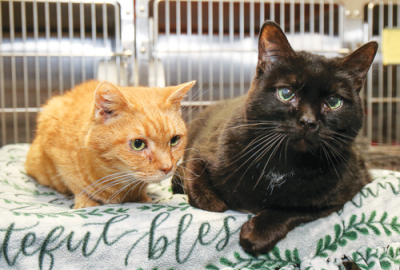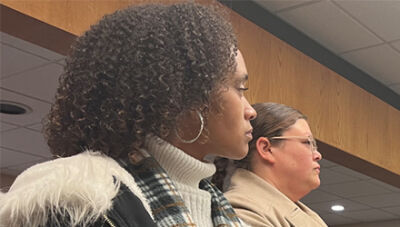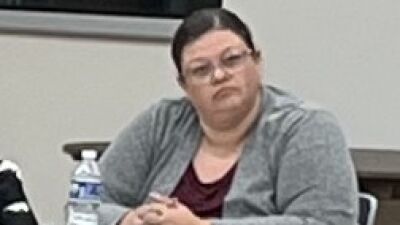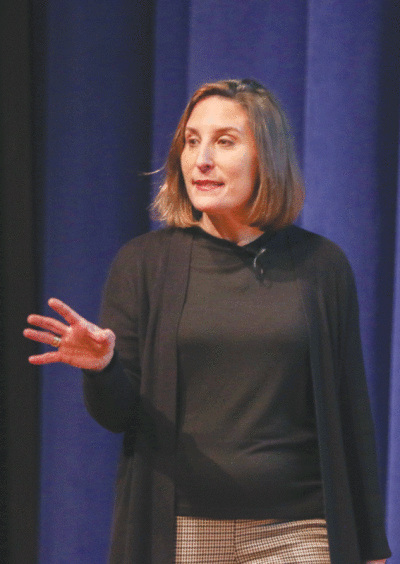
New York Times bestselling author Rosalind Wiseman visited Warren Woods Tower High School March 6 to talk to families about social media and mental health.
Photo by Patricia O’Blenes
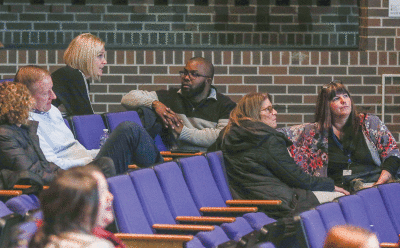
A couple of times during the evening, author Rosalind Wiseman encouraged the audience members to discuss matters she brought up at the presentation. Pictured here is Warren Woods Public Schools Superintendent Stacey Denewith-Fici, sitting in the top row.
Photo by Patricia O’Blenes
WARREN — That is “so fetch.”
That phrase will sound familiar to anyone who saw the 2004 movie “Mean Girls,” starring Lindsay Lohan.
The popular film, written by actress Tina Fey of “Saturday Night Live” fame, was based on the book “Queen Bees and Wannabes: Helping Your Daughter Survive Cliques, Gossip, Boyfriends, and Other Realities of Adolescence,” by Rosalind Wiseman.
On the evening of March 6, Wiseman brought her message to Warren Woods Tower High School to talk to families about the advantages and disadvantages of social media and how it affects mental health.
The New York Times bestselling author — also the co-founder of Cultures of Dignity, which works with others to successfully navigate the social challenges of young adulthood — offered scenarios and advice to parents and students in the audience. Wiseman pointed out children and teenagers today don’t have the privacy of past generations “because of social media and tracking devices.”
“Social media is about creating, connecting and consuming,” Wiseman said. “When we post anything on social media, you are trying to please an invisible audience. It becomes visible depending on how many ‘likes’ you get.”
Adults and teens who post on TikTok, Snapchat, Instagram and Facebook should ask themselves, “How does what you’re posting show how you see the world? What you’re proud of about yourself? What you think is important? How much of your social media is fake?”
She suggested several things that students and their parents could do together to “get a grip” on social media. They included unfollowing five accounts that make you compare your life to other people, turning off notifications, checking in with each other to be honest and following two people that are inspirational.
“We live in a world that does not want us to be happy,” Wiseman continued. “As we go through the ups and downs of life, it’s important to remember, ‘What is our foundation?’”
She, too, wanted each person in the audience to ask themselves that night, “What do you think your family values are?” The writer gave an example of her own experiences with her two sons, stating that it’s OK for parents to ask for guidance. She told the crowd her older son, an athlete who did well in school, had anxiety and “would feel overwhelmed by things.” She reached out to others for help.
“When something bad is happening to your kids, you feel like you are in a storm and you don’t know what to do. I had to have support around me to be able to help him because, as a parent, I loved him too much. My anxiety and being upset stopped me from being able sometimes to help him the way he needed,” Wiseman said. “I had a lot of people who knew him and loved him be able to help me and my husband through. Sometimes we get this message as parents (that) we have to do all this ourselves. We have to have people around us, which gets us to this cliché that it takes a village to raise a child.
“But guess what? Villages are really complicated. People don’t agree in a village. People get into arguments about parenting in a village. They have very different rules about social media. It’s complicated,” Wiseman said. “So, I am going to give you some thoughts about how to make it less complicated. My goal tonight is that you walk out of here thinking about something differently and something you can employ in your life right now.”
‘Dignity is the inherent worth of each of us’
Her five points for happiness included meaning beyond oneself, hope of success, social connection, satisfying work, and a place to process and find peace. She also feels the word “respect” isn’t always fully understood and explained the difference between respect and dignity.
“Respect is one of the most overused, misused words in school. Every school in the country has the word ‘respect’ on the walls. Respect is used dishonestly. Respect is earned. Respect is admiring somebody’s actions,” Wiseman said. “Dignity is given. Dignity is a base level that everybody gets. Dignity is the inherent worth of each of us. Using a word to put somebody down is taking away their dignity.”
And if a classmate mistreats you, Wiseman’s advice is: “You do not have to be friends with this kid. You don’t have to respect that kid’s action, but you need to treat that person with dignity.”
While Wiseman is best known for her book about girls navigating through adolescence, the Colorado resident reminded the audience young boys face problems and they have feelings, too. Sometimes, when they’re quiet or playing a video game alone, it doesn’t mean something isn’t bothering them.
“Boys manifest their feelings differently. Boys have deep emotional connections to each other. Everything in boy world always has to be funny,” Wiseman said. “Just because you are a boy doesn’t mean you have to sit there and say, ‘I’m fine.’”
Listening is important for both kids and adults. Sometimes, “We are so hard on people, we can’t focus on solving the problems,” Wiseman advised.
Wiseman is the author of three other books, including “Masterminds and Wingmen: Helping Our Boys Cope with Schoolyard Power, Locker-Room Tests, Girlfriends, and the New Rules of Boy World.” She also wrote “Boys, Girls, and Other Hazardous Materials,” and “Courageous Discomfort: How to Have Important, Brave, Life-Changing Conversations about Race and Racism.”
District Superintendent Stacey Denewith-Fici said that last fall, school officials sent out a survey to parents asking them what they would like to see in terms of a community event.
“The majority of parents listed social media and mental health as the two topics they were most interested in learning about,” Denewith-Fici said. Plans then were made to invite Wiseman to the school.
Marcy Young, the mother of an 11-year-old daughter and two stepchildren, was among the parents who attended the presentation.
“I wanted to see other people’s viewpoints on how cellphones are affecting other families,” Young said, adding that she enjoyed Wiseman’s presentation. “She’s very intelligent. She knows her stuff. It was very informative. I want to read her books.”
 Publication select ▼
Publication select ▼